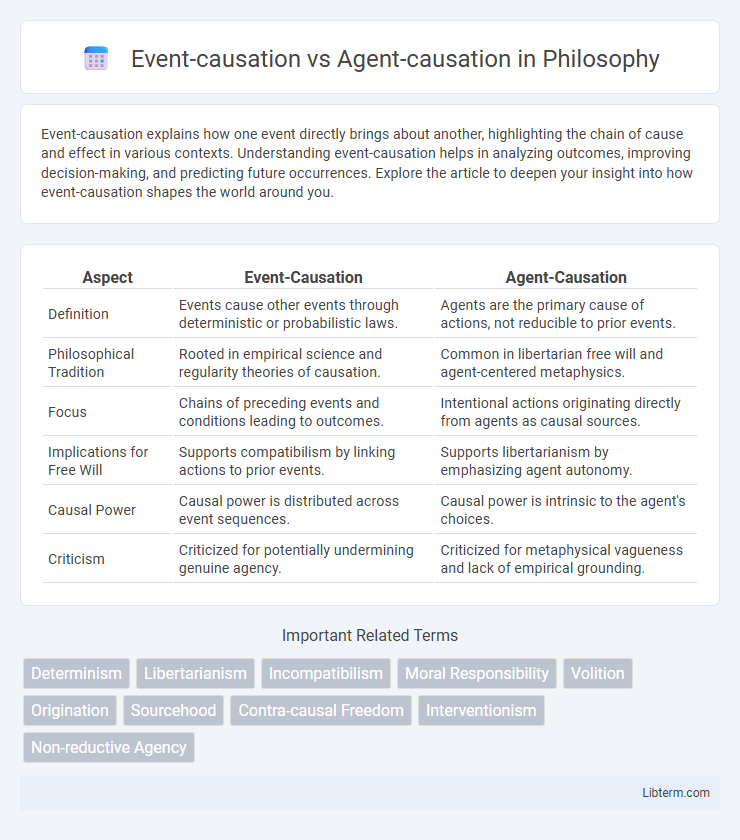Event-causation explains how one event directly brings about another, highlighting the chain of cause and effect in various contexts. Understanding event-causation helps in analyzing outcomes, improving decision-making, and predicting future occurrences. Explore the article to deepen your insight into how event-causation shapes the world around you.
Table of Comparison
| Aspect | Event-Causation | Agent-Causation |
|---|---|---|
| Definition | Events cause other events through deterministic or probabilistic laws. | Agents are the primary cause of actions, not reducible to prior events. |
| Philosophical Tradition | Rooted in empirical science and regularity theories of causation. | Common in libertarian free will and agent-centered metaphysics. |
| Focus | Chains of preceding events and conditions leading to outcomes. | Intentional actions originating directly from agents as causal sources. |
| Implications for Free Will | Supports compatibilism by linking actions to prior events. | Supports libertarianism by emphasizing agent autonomy. |
| Causal Power | Causal power is distributed across event sequences. | Causal power is intrinsic to the agent's choices. |
| Criticism | Criticized for potentially undermining genuine agency. | Criticized for metaphysical vagueness and lack of empirical grounding. |
Understanding Event-Causation: Core Concepts
Event-causation refers to the principle that every event is caused by preceding events in a deterministic chain, emphasizing a continuous flow of cause and effect throughout the universe. This concept is central in metaphysics and philosophy of mind, as it supports the view that events are linked through natural laws governing temporal sequences. Understanding event-causation involves recognizing how external conditions and prior events systematically generate subsequent occurrences without invoking autonomous agents.
Defining Agent-Causation in Philosophy
Agent-causation in philosophy refers to the concept where an agent, as an autonomous entity, initiates actions independent of deterministic events or prior causes. This contrasts with event-causation, which explains actions as outcomes of preceding events in a causal chain. Agent-causation emphasizes the role of individuals as origins of intentional actions, highlighting metaphysical discussions on free will and moral responsibility.
Historical Background of Causation Theories
The historical background of causation theories traces back to Aristotle's four causes, where event-causation emphasizes a chain of events leading to effects, while agent-causation centers on an agent's intentional power to cause outcomes. Early modern philosophers such as David Hume critically analyzed event-causation, questioning the necessary connection between causes and effects, whereas proponents of agent-causation like Roderick Chisholm revived the concept to defend free will and moral responsibility. These debates laid the groundwork for contemporary discussions in metaphysics concerning causal powers, human agency, and the structure of causality in both natural and social realms.
Key Differences Between Event-Causation and Agent-Causation
Event-causation attributes actions to prior events creating a deterministic chain, emphasizing that every effect follows from preceding causes. Agent-causation centers on agents as originators of actions, suggesting that individuals possess the intrinsic power to initiate new causal chains independent of prior events. The key difference lies in event-causation's reliance on external conditions versus agent-causation's focus on autonomous agency and free will.
Event-Causation: Strengths and Limitations
Event-causation, emphasizing cause-and-effect relationships between events, provides a clear, scientifically grounded framework for understanding how specific occurrences generate subsequent outcomes. Strengths include its empirical basis and compatibility with physical laws, enabling predictive modeling and objective analysis in various fields. Limitations involve challenges in explaining intentionality and free will, as event-causation often reduces actions to prior events, potentially overlooking agent autonomy and moral responsibility.
Agent-Causation: Key Advantages and Criticisms
Agent-causation emphasizes the role of the individual as the originator of actions, highlighting personal responsibility and moral accountability in philosophical debates on free will. This perspective allows for a coherent understanding of human agency that is not reducible to prior events or deterministic causes, making it appealing to advocates of libertarian free will. Critics argue that agent-causation lacks clear empirical support and struggles to explain how agents exert causal power without being influenced by preceding events, raising questions about its coherence and practical applicability.
Free Will and Moral Responsibility in Causation
Event-causation posits that every action is the inevitable result of preceding events governed by causal laws, challenging the notion of free will by suggesting that individual choices are predetermined. Agent-causation argues that agents themselves, as originators of actions, possess the capacity to initiate new causal chains independent of prior events, thereby grounding moral responsibility in authentic freedom. Understanding these contrasting views is crucial for debates on free will, as they shape how moral accountability is attributed to human behavior in philosophical and legal contexts.
Major Philosophers on Causation: Hume to Chisholm
David Hume argued for event-causation, positing causality as constant conjunctions between events observed through experience, rejecting inherent necessity. Roderick Chisholm defended agent-causation, emphasizing the agent's power to initiate actions independently of prior events, grounding free will in personal agency. The debate marks a crucial shift from deterministic interpretations of causality to more libertarian perspectives within the philosophy of action.
Practical Implications: Science, Law, and Ethics
Event-causation, emphasizing cause-and-effect relationships between events, underpins scientific methodologies by enabling predictability and replicability in experiments, while agent-causation, highlighting conscious agents as initiators of actions, influences legal systems in determining moral and legal responsibility. In law, agent-causation supports the attribution of accountability to individuals for intentional acts, whereas event-causation informs negligence and causality assessments through objective evidence. Ethical frameworks grapple with these models to balance deterministic explanations and individual autonomy, impacting debates on free will, responsibility, and justice in practical contexts.
Contemporary Debates: Event-Causation vs Agent-Causation
Contemporary debates on event-causation versus agent-causation center on whether actions are best explained by prior events or by agents as originators of causation. Event-causation theories emphasize deterministic chains of events influencing outcomes, while agent-causation frameworks argue that agents themselves possess causal power independent of prior event sequences. This discourse impacts philosophical interpretations of free will, moral responsibility, and the nature of human agency.
Event-causation Infographic

 libterm.com
libterm.com